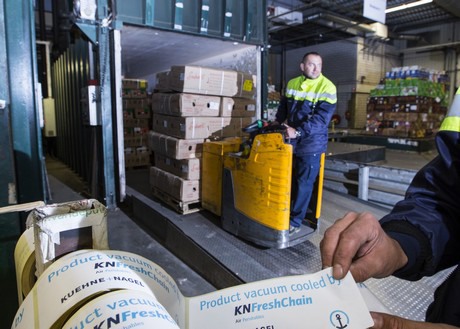Kuehne + Nagel originally started with seaborne cargo in 1890 from the German ports of Bremen and Hamburg, and after 1950 they quickly internationalised in all forms of modality. They also offer their services in air freight, for example. The company is one of the larger players in the transport of fresh produce products globally.

“With our air freight, we operate from Schiphol Airport, the Netherlands, for example,” says Natasha Solano, manager development of air transport for perishables for Kuehne + Nagel. “The share of air freight is still increasing in the fresh produce sector, and we’re not expecting it to start decreasing in the coming years.”
Speed
“Although air freight is the most expensive mode of transport, customers mostly choose this type of transport because of its speed.” For the most perishable goods, such as, for instance, flowers and plants that are exported from the Netherlands to the US and Canada or raspberries from Mexico to the Netherlands, air freight is actually the only solution that allows the products to arrive in good quality at their destination.
Keeping the supply chain closed
“Because of the diversity of the air freight supply chain – such as road transporters, shipping agents, airline handling, sanitary and health inspections and air carriers – the transport of perishables per air requires constant attention. Cooperation and a seamless communication between all of these parties are crucial to retain a cold supply chain as closed as possible. Because of the growing costs of transport within the total cost of the supply chain of perishables, customers aren’t always willing to invest in extras, such as, for example, passive cooling or temperature monitoring.”
Global network
Kuehne + Nagel doesn’t just offer several types of transport, they also have a global network of their own stations for perishable air freight. A number of these stations offer so-called Value Added Services for perishables in addition to the regular air freight services, for major supermarket chains, for instance. “Our stations have been set up in such a way that the products we receive for storage can be handled and/or stored in an optimal manner. This contributes to the shelf life of these products, and we hope to be able to contribute to the fight against food waste. Right now, all of our stations for perishable air freight are being certified FreshChain by our own QHSE organisation, so that customers can always assume that the station in Bogota, Colombia, has the same high standard and supplies the same quality as the station at Schiphol or Los Angeles. By having all types of intermodal transport and by working with just one system within the company, we can also keep the communication lines short and offer our customers complete transparency.”
For more information:
Natasha Solano
Global Perishables Development
Director Air Logistics
Kuehne + Nagel
Avenida Central 34
Centro de Carga Aerea
28042 Barajas
Spain
Tel: +34 6 71 67 08 91
[email protected]
www.kuehne-nagel.com
